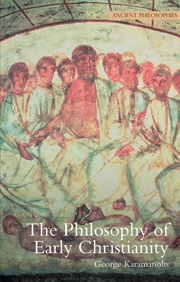Book contents
- Frontmatter
- Dedication
- Contents
- Preface
- Abbreviations
- Chronology
- Introduction
- 1 The Christian conception of philosophy and Christian philosophical methodology
- 2 Physics and metaphysics: first principles and the question of cosmogony
- 3 Logic and epistemology
- 4 Free will and divine providence
- 5 Psychology: the soul and its relation to the body
- 6 Ethics and politics
- Conclusion
- Appendix: the protagonists
- Notes
- Further reading
- Bibliography
- Index
Conclusion
- Frontmatter
- Dedication
- Contents
- Preface
- Abbreviations
- Chronology
- Introduction
- 1 The Christian conception of philosophy and Christian philosophical methodology
- 2 Physics and metaphysics: first principles and the question of cosmogony
- 3 Logic and epistemology
- 4 Free will and divine providence
- 5 Psychology: the soul and its relation to the body
- 6 Ethics and politics
- Conclusion
- Appendix: the protagonists
- Notes
- Further reading
- Bibliography
- Index
Summary
In the Introduction, I set out the aim of this book as not merely to survey the views of early Christians on some key philosophical areas but also to show that early Christians engage with philosophical questions similar to those the pagans who were their contemporaries also address, and that they do so using similar methods, which essentially include various kinds of philosophical arguments. I do not want to deny, of course, that Christians were relying on Scripture, or even that they were relying primarily on Scripture. All I wanted to establish is that this did not help them much in developing views about complex philosophical questions, which they could not avoid if they wanted to spell out and properly defend the message of Christianity. Their emphasis on the authority and the truthfulness of Scripture should not obscure the fact that this is not the tool they used to articulate their views on philosophical issues such as the nature of matter, the question of free will or the soul–body relation. In Scripture they could at most find hints to a view, but no philosophical arguments or theories. For the development of such arguments or theories Scripture is of little help.
- Type
- Chapter
- Information
- The Philosophy of Early Christianity , pp. 237 - 240Publisher: Acumen PublishingPrint publication year: 2013

